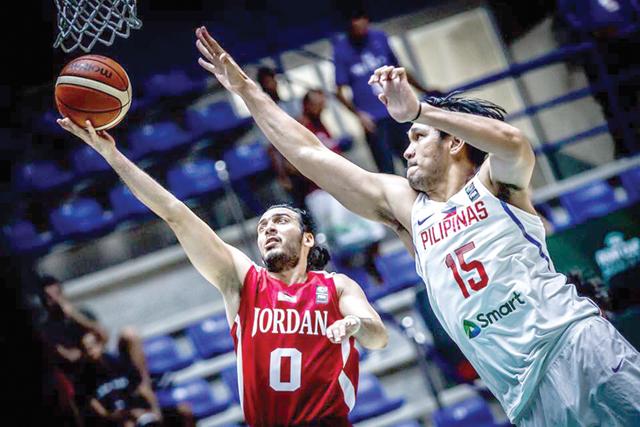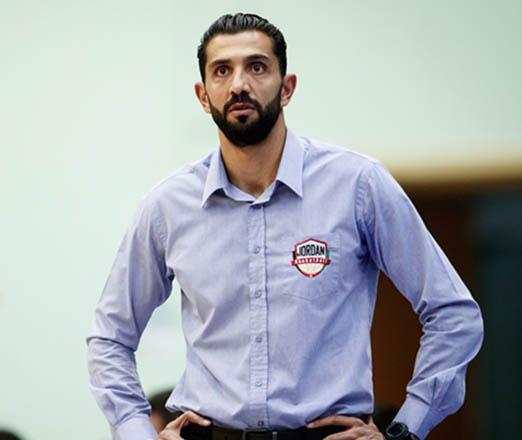You are here
Despite challenges, national basketball team has high hopes
By Suzanna Goussous - Aug 23,2017 - Last updated at Aug 23,2017

Jordan national basketball player Mahmoud Abdeen in action against the Philippines at the FIBA Asia Cup Championship in Beirut on Sunday (Photo courtesy of fiba.com)
AMMAN — The FIBA Asia Cup Championship held last week in Lebanon “showed us where we stand as a national team and how much work we have to put in to improve our performance”, the national team’s head coach Sam Daghlas said.
Although the national team represented Jordan with some core players missing such as Zaid Abbas, Dar Tucker and naturalised player Kevin Ware, “they have proved that they can take responsibility and place Jordan back on the regional basketball map, leaving the team and the basketball community with some challenges to overcome”, he said.
Jordan ranked 8th in the championship which took place from August 8 to August 20. Jordan beat Syria 68-66, India 61-54, and lost to Iran 83-71.
The national team then trounced Iraq 84-70, which qualified the national team to the quarter-final, followed by a 98-70 loss to New Zealand, China 86-55, and a close 75-70 loss to the Philippines.
Asia Cup preparations
The training sessions started on July 8. Daghlas said: “The national team only had 18 practice sessions, which is not enough to face teams such as Australia and Iran, which played more than 30 games, while our national team played around seven matches, with some players attending only five of these.”
“When we prepare three to four weeks prior to the game, we are doing injustice to the players, the audience, and the country,” he added.
The time given for preparations was not sufficient to improve the players’ flexibility, he said, “You can’t blame the players for their low levels of flexibility, they had a very short period of time to practice.”
Challenges
One of the main challenges during the championship was that the naturalised player, Kevin Ware, could not take part due to some missing documents that Jordan could not provide in the required short period of time.
“At first, players didn’t know whether they would play or not, with the pressure and fear increasing, the Jordanian team players, however, proved themselves and accepted the challenge,” Daghlas told The Jordan Times.
Daghlas said the national team managed to reduce the score difference and challenge a team known for their rich experience and basketball background when they played against Iran.
“Playing with a team with many experienced international players and losing by around 10 points is an achievement for us, especially that the team consists of players who took part in international leagues and matches, such as Hamed Haddadi in China,” he added.
Most challenging matches
One of the most challenging games at the championship was Jordan’s game with Iraq as it qualified the winning team to the quarter-finals, Daghlas said
“They had pressure because they are the only ones fighting for the game and keeping it alive, because if they let it go, it will die, they are holding the last thread,” the head coach said.
He said that Jordan’s game with China was difficult for the players as it happened after losing to New Zealand in the quarter-finals and getting disqualified almost halfway through the championship, players were feeling down.
Jordan’s national team was the last Arab team to disqualify from the championship, after Lebanon lost to Iran, Iraq lost to Jordan and Syria lost to China, which Daghlas considered as an accomplishment for Jordan.
The addition of Australia and New Zealand to the championship “made Asia Championship much tougher”, according to Daghlas, as it raised the standards of the championship.
New face
Daghlas said the new head of the Jordan Basketball Federation, Amer Abu Rashed, believes in the team players and wants to make a difference.
“He took the first step to keep practice sessions going for the next five months to prepare players for the first games that would qualify the national team for the 2019 World Cup in China,” he added.
Daghlas said: “In order to face international teams, you have to set goals for the next five years, to improve and sustain that improvement.”
In November, Jordan will take on Syria in Beirut and Lebanon in Amman for a chance to qualify to the World Cup, he said.
The team will work towards increasing players’ flexibility and conditioning, with extensive training sessions before November, he added.
What you invest is what you get
“What you invest in them is what you are going to get. There is potential but it needs to be given a chance. Our problem is we don’t believe in investing but we want something in return and it won’t ever work out like that,” Daghlas said.
Daghlas said the team’s eldest player, Musa Awadi, is only 31 years old, which is a plus for the team and the younger generation to prove themselves in the basketball community locally, regionally and internationally.
He said the team consists of many young players with potential, such as Amin Abu Hawwas, Sammy Bzei, Malek Kanaan and Sinan Eid.
He urged the basketball community in Jordan to avoid negativity and to trust the reform process of the national team and the federation director.
“Negativity towards fixing the game harms the game, players, and the country... At the end of the day, we go abroad to represent Jordan. Every Jordanian has the right to see his or her national team playing on the highest level,” he added.
Point guard Mahmoud Abdeen, a national team leader in scoring and assists said: “We showed people that if we prepare, we will achieve high results.”
The national team challenged highly trained teams such as Iran and the Philippines and reduced the score difference, even with some injured teammates, Abdeen told The Jordan Times.
Lessons learned
Abdeen noted the championship showed the importance of having a Jordanian league and that more attention should be paid to the national team and competing in matches and championships with top level teams.
Teams such as Iran, China and Lebanon started raising the bar for basketball in Asia with the addition of New Zealand and Australia, which motivates the Jordan national team to do the same, he added.
Abdeen feels “optimistic” about the new federation, formed two months ago, as it set a plan for the next few months and will also work on the 2018 plan ahead of time.
Power forward Zaid Abbas wrote on his Facebook page that the “victories were the result of team effort, the coaches, and a former team clubs and federation personnel”.
Abbas voiced hope that the new federation would have higher ambitions to meet the requirements of the game and the national team.
He called upon the Jordan basketball community to support players and coaches, adding that the effort of the players and coaches must be acknowledged.
On his Facebook page, power forward Ahmad Hamarasheh wrote the championship had the good and the bad, stressing the importance of learning from mistakes.
“We played without a naturalised player and qualified to the quarter-finals... We need the support of everyone, companies, clubs, federation and the audience... let’s be positive,” he wrote.
Daghlas said: “In any sport, there are wins and losses… Nothing is promised, you just have to give it your all and do what is right.”
“My goal is to help change lives, change basketball to make it better. This is not a one-man-job, this is a basketball community and a country, but I want to initiate it,” he added.
Related Articles
AMMAN — Jordanian basketball has lost its lustre over the past years due to financial, technical and administrative challenges, team players
AMMAN — Sam Daghlas started playing basketball at the age of 14 in the US after having practiced football in Jordan, which made him realise
AMMAN — Jordan will play Tunisia on Wednesday in their second match at the Arab Nations Basketball Championship currently under way in Dubai

















